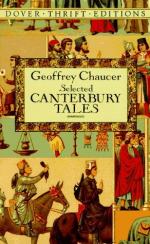|
|
The Canterbury Tales Author/Context
Geoffrey Chaucer lived during a tumultuous period in England's history. During his early youth, the Bubonic Plague terrorized Europe, killing a large portion of the population, and forever leaving a lasting impression on those surviving the catastrophe. Throughout Chaucer's life, the Church was also in an upheaval. It was caught in a position of deception and uncertainty, perhaps because of the Plague and perhaps because of economics. Nonetheless, the fraud occurring within the holy walls influenced Chaucer's work. During his lifetime, the Hundred Years War between England and France also took place, which again placed a violent element in Chaucer's work.
It is this period of political and social turmoil in England that allowed Chaucer to produce a large body of influential work. Known as a poet and often as a friend of the nobility, Chaucer was ultimately part of the bourgeois of England. Very little is actually known about his life, despite his rearing by a middle-class family. His father was in the wine and leather trade, perhaps giving the family their surname - Chaucer - for it means a maker of footwear. He was a page in a royal household during his youth, continued his relationship with royalty throughout his life, married the daughter of a knight, Philippa, and traveled to France and Spain. His life was that of "an active, responsible civil servant and cosmopolitan courtier" (Halverson x).
Because of the political unrest of the time and Chaucer's witty, sharp, sarcasm, he wrote The Canterbury Tales, a group of fabliau and fragments, consisting of a piece of each of England's stereotypical citizen archetypes put together in a mixing pot on their pilgrimage to Canterbury. The destination is not as significant as is the action that occurs along the way. The Tales are not even finished and the destination is never even reached during the course of the writing.
"That The Canterbury Tales was left unfinished may well have been a matter of choice, not fate. It is likely that Chaucer abandoned his great literary work in the last years of his life and turned his thoughts to the salvation of his soul, as the Retraction suggests. He not only abandoned the tales but also expressed regret for having ever written them, except those explicitly religious and moral" (Halverson, xx-xxi).
These fragmented stories and prologues bring together a brilliant satire of Chaucer's contemporary England, commenting not only on the people of the time, but bringing in Christianity, perhaps primeval feminism with the Wife of Bath, anti-Semitism, sexuality, unfaithfulness, and humor. Although not all of the tales are finished, and the entire work is cut short and book-ended with a retraction, Chaucer's wit stands strong. When looking at Chaucer's work, four things must be remembered about Chaucer himself and his time period. He was a Catholic during the end of Catholicism in England, he was chivalric, he was English, and he was part of the Bourgeois. This combination of characteristics yielded what is now considered one of the most important manuscripts in the English language.
Bibliography
Chaucer, Geoffrey. The Canterbury Tales. Ed. John Halverson. The Bobbs-Merrill
Company, Inc.: Indianapolis, 1971.
Chesterson, G.K. Chaucer. Greenwood Press, Publishers: New York, 1969.
Coghill, Nevill. The Poet Chaucer. Oxford University Press: London, 1967.




